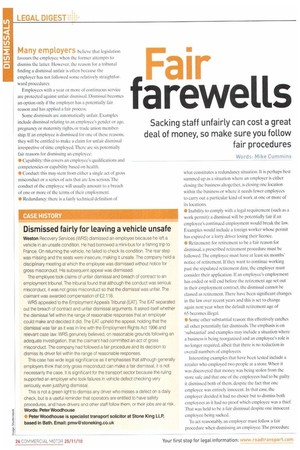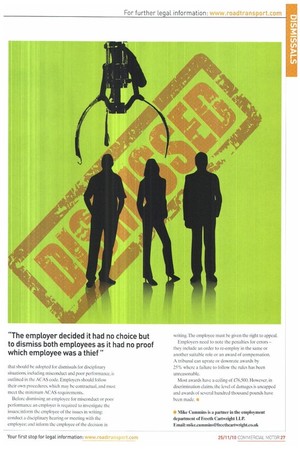Fair farewells
Page 26

Page 27

If you've noticed an error in this article please click here to report it so we can fix it.
Sacking staff unfairly can cost a great deal of money, so make sure you follow fair procedures
Words: Mike Cummins Many employers believe that legislation favours the employee when the former attempts to dismiss the latter. However, the reason for a tribunal finding a dismissal unfair is often because the employer has not followed some relatively straightforward procedures.
Employees with a year or more of continuous service are protected against unfair dismissal. Dismissal becomes an option only if the employer has a potentially fair reason and has applied a fair process.
Some dismissals are automatically unfair. Examples include dismissal relating to an employee's gender or age. pregnancy or maternity rights, or trade union membership. If an employee is dismissed for one of these reasons. they will be entitled to make a claim for unfair dismissal irrespective of time employed. There are six potentially fair reasons for dismissing an employee: • Capability: this covers an employee's qualifications and competencies or capability based on health.
• Conduct: this may stem from either a single act of gross misconduct or a series of acts that are less serious. The conduct of the employee will usually amount to a breach of one or more of the terms of their employment.
• Redundancy: there is a fairly technical definition of what constitutes a redundancy situation. It is perhaps best summed up as a situation where an employer is either closing the business altogether, is closing one location within the business or where it needs fewer employees to carry out a particular kind of work at one or more of its locations.
• Inability to comply with a legal requirement (such as a work permit): a dismissal will be potentially fair if an employee's continued employment would break the law. Examples would include a foreign worker whose permit has expired or a lorry driver losing their licence.
• Retirement: for retirement to be a fair reason for dismissal, a prescribed retirement procedure must be followed. The employee must have at least six months' notice of retirement. If they want to continue working past the stipulated retirement date, the employer must consider their application. If an employee's employment has ended or will end before the retirement age set out in their employment contract, the dismissal cannot be classed as retirement.There have been significant changes in the law over recent years and this is set to change again next year when the default retirement age of 65 becomes illegal.
• Some other substantial reason: this effectively catches all other potentially fair dismissals. The emphasis is on 'substantial' and examples may include a situation where a business is being reorganised and an employee's role is no longer required, albeit that there is no reduction in overall numbers of employees.
Interesting examples that have been tested include a retailer who employed two people at a store. When it was discovered that money was being stolen from the store safe and that one of the employees had to be guilty it dismissed both of them, despite the fact that one employee was entirely innocent. In that case, the employer decided it had no choice but to dismiss both employees as it had no proof which employee was a thief. That was held to be a fair dismissal despite one innocent employee being sacked.
To act reasonably, an employer must follow a fair procedure when dismissing an employee. The procedure that should be adopted for dismissals for disciplinary situations, including misconduct and poor performance, is outlined in the ACAS code. Employers should follow their own procedures. which may be contractual, and must meet the minimum ACAS requirements..
Before dismissing an employee for misconduct or poor performance an employer is required to investigate the issues; inform the employee of the issues in writing; conduct a disciplinary hearing or meeting with the employee: and inform the employee of the decision in writing. The employee must be given the right to appeal.
Employers need to note the penalties for errors — they include an order to re-employ in the same or another suitable role or an award of compensation. A tribunal can uprate or downrate awards by 25% where a failure to follow the rules has been unreasonable.
Most awards have a ceiling of £76,500. However, in discrimination claims, the level of damages is uncapped and awards of several hundred thousand pounds have been made. If
• Mike Cummins is a partner in the employment department of Freed] Cartoright LLP. Email: mike.c ttttt inins@lreethcartoright.co.uk




































































































































